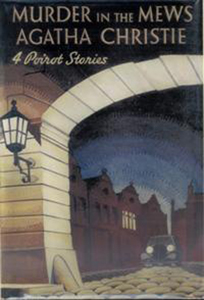I generally prefer Agatha Christie’s novels to her short stories, and now “Dead Man’s Mirror” (1937, also published as “Murder in the Mews”) gives me a crack at another format. The collection includes three novellas (84, 55 and 61 pages) and one 30-page short story.
I enjoyed all four Poirot yarns, all of which were originally published in magazines (the first two in shorter forms). The first two are on the typical side, but the last two are a cut above, with particularly satisfying endings.
“Dead Man’s Mirror”
For someone who works with the tropes of detective stories – and often comments on them – Christie rarely writes the same story twice up to this point in her career. So “Dead Man’s Mirror” (an expansion of “The Second Gong”) is remarkable in that it calls to mind specifics of so many previous novels.

“Dead Man’s Mirror” (1937)
Also published as: “Murder in the Mews”
Author: Agatha Christie
Genre: Mystery novellas
Series: Hercule Poirot No. 17
Settings: London; Rhodes (Greece); 1920s-30s
When the manor patriarch is found dead in his locked study, it calls to mind “The Murder of Roger Ackroyd” so much so that I wondered if this was the prototype for that novel (but even the original version post-dates “Ackroyd”). And then we have the usual multiple wills, hidden romances and secret identities.
There are many ways to put together the puzzle pieces, and I admit I did not solve the mystery. Still, “Dead Man’s Mirror” is so filled with the standard pieces that it would make an excellent minimal-investment introductory yarn if someone wants to test if they like Poirot stories or not.
“The Incredible Theft”
“The Incredible Theft” (an expansion of “The Submarine Plans”) likewise uses the “house full of suspects after a dinner party” format, although it’s rare in that it chronicles a theft rather than a murder. Christie shows good insight into political life and maneuverings as a packet of airplane bomber schematics is the item in question.
In the time of Christie, as we’ve also seen in works such as “The Secret Adversary,” packets of documents are the equivalent of a data disc or drive from a half-century later. In the digital world, these types of cases have become harder to write.
“Murder in the Mews”
“Murder in the Mews” is the best of this collection because of how it ends (something I won’t spoil here). Even before the clever conclusion, we get a classic team-up between Poirot and Inspector Japp and good writing of a young woman, Miss Plenderleith, whose roommate is found dead in one of those situations where it looks like suicide but it might be … murder!
It’s notable for taking place on Guy Fawkes Day, when Poirot prophetically notes that the sound of a gunshot could easily be covered up by a blast of fireworks. Despite the timeframe, the yarn doesn’t get political the way “The Incredible Theft” does, although Poirot does intriguingly note that it’s a strange holiday: Are people celebrating the nobility of the attempt to blow up Parliament, or the failure of that attempt? No doubt there are some on each side.
“Triangle at Rhodes”
The short story, “Triangle at Rhodes,” wonderfully closes out the collection. Indeed, this is my favorite Poirot short up to this point in Christie’s catalog.
Usually the Belgian detective comes in after a murder, but here – while vacationing on the titular Greek island in the offseason (hoping for minimal crowds) – he perceives that a murder is going to happen among the small group of beachfront hotel guests. And why shouldn’t his intuitive skills work in that direction, too? He tries to prevent the killing, but he only has so much control over other people.
Christie marvelously explores human nature – with Poirot (in a Marple-esque observation) noting that behavior can be predicted by an astute observer – specifically as their actions play out in love triangles. Even as the author breaks down amusing stereotypes about how men and women behave, she (and Poirot) stays a step ahead of us as she builds toward a satisfying twist ending.
All told, the “Dead Man’s Mirror” collection is not extra-special, but it serves up four foundational stories in the career of Hercule Poirot that fans will enjoy.
Every week, Sleuthing Sunday reviews an Agatha Christie book or adaptation. Click here to visit our Agatha Christie Zone.


